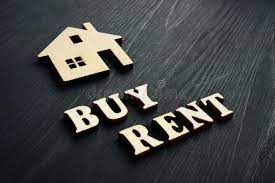As you embark on your journey to find a new home, one of the most crucial decisions you’ll need to make is whether to rent or buy. Renting and buying both have their advantages and disadvantages, and it’s essential to weigh them carefully before making a choice that aligns with your financial situation and long-term goals.
In this article, we’ll delve into the pros and cons of renting vs buying, helping you make an informed decision.

Pros of Renting:
- Flexibility: Renting offers flexibility in terms of mobility. If you have a job that requires you to move frequently or you’re unsure about settling down in one place for an extended period, renting provides the freedom to relocate without the burden of selling a property.
- Lower upfront costs: Renting typically requires lower upfront costs compared to buying a home. You may only need to pay a security deposit and the first month’s rent, making it more affordable for those with limited savings or a tight budget.
- Lower maintenance responsibilities: As a renter, you are not responsible for major repairs or maintenance costs. If something goes wrong, such as a leaky roof or a malfunctioning appliance, it’s generally the landlord’s responsibility to fix it, saving you time and money.
- Amenities and services: Many rental properties offer amenities and services such as gyms, swimming pools, and maintenance staff, which can enhance your lifestyle and save you the hassle of arranging for these services yourself.
Cons of Renting:
- Lack of equity: Renting means you do not build equity. Instead of investing in a property that can appreciate over time, you are essentially paying someone else’s mortgage and not building any ownership in the property.
- Limited control: As a renter, you may have limited control over the property. You may not be able to make changes or improvements without the landlord’s permission, which can limit your ability to personalize your living space.
- Rent increases: Rent is subject to change at the end of the lease term, and your landlord can increase the rent, potentially making it less affordable over time.
- No tax benefits: Renting does not offer the tax benefits that come with owning a home, such as mortgage interest deductions and property tax deductions, which can result in higher tax liabilities.
Pros of Buying:
- Equity and potential for appreciation: One of the most significant advantages of buying a home is building equity and the potential for appreciation. Over time, as you pay down your mortgage, you are building ownership in the property, and if the property appreciates in value, you can gain equity, which can be used for future investments or as a source of wealth.
- Freedom and control: When you own a home, you have the freedom to make changes and improvements to the property as you see fit, without seeking permission from a landlord. You also have control over your living space and can customize it to suit your needs and preferences.
- Stability: Owning a home provides stability and a sense of belonging. You can establish roots in a community, and your home can serve as a place of comfort and security for your family.
- Tax benefits: Homeownership comes with tax benefits, such as mortgage interest deductions and property tax deductions, which can lower your overall tax liabilities and potentially save you money.
Cons of Buying:
- Higher upfront costs: Buying a home typically requires a substantial upfront cost, including the down payment, closing costs, and other associated fees. This can be a barrier for those with limited savings or a tight budget.
- Maintenance responsibilities: As a homeowner, you are responsible for the maintenance and repairs of the property. This includes costs for routine maintenance, repairs, and upkeep, which can add up over time and increase your overall expenses.
- Less flexibility: Unlike renting, buying a home is a long-term commitment. If you need to move for work or personal reasons, selling a property can be time-consuming and may involve additional costs, such as real estate agent fees and closing costs.
- Market fluctuations: The real estate market can be volatile, and the value of your property may fluctuate. There’s no guarantee that your home will appreciate in value, and if the market experiences a downturn, you may end up with less equity than you initially invested.
- In conclusion, both renting and buying have their pros and cons, and it’s crucial to carefully consider your financial situation, lifestyle, and long-term goals before making a decision. Renting offers flexibility, lower upfront costs, and fewer maintenance responsibilities, but it lacks the potential for equity and tax benefits. On the other hand, buying a home provides equity, stability, and tax benefits, but it requires higher upfront costs, more maintenance responsibilities, and less flexibility.
- To make the right decision, consider your current financial situation, future goals, and lifestyle preferences. If you value mobility and flexibility, renting may be a better option. However, if you’re looking to build equity, establish roots in a community, and enjoy the tax benefits of homeownership, buying a home may be the right choice for you. It’s also essential to factor in other costs such as property taxes, insurance, and ongoing maintenance expenses when comparing the overall affordability of renting vs buying.
- Ultimately, it’s recommended to seek advice from a qualified financial professional or a real estate expert to evaluate your individual circumstances and make an informed decision that aligns with your financial goals and lifestyle. Whether you choose to rent or buy, remember to carefully weigh the pros and cons and make a decision that best suits your needs and financial situation.

